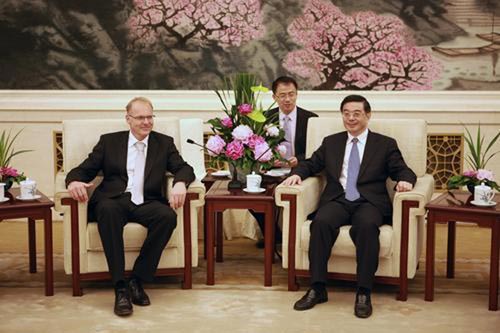
China's top judge, Zhou Qiang met Hungary's top judge on the 19th May 2014
China's supreme court has urged officials from the ruling Communist Party to shun Western-style judicial independence and reject "erroneous Western thought", state media said on Thursday, as controls over the media, dissent and the Internet are tightened.
The comments by China's Supreme Court, Beijing's latest attack on Western ideology, are also another sign of President Xi Jinping's conservative political agenda.
The party has signalled that it will not embark on political reform, despite hopes that Xi, the son of a former liberal-minded vice premier, might relax tight central controls.
A meeting of the Supreme Court's party committee on Wednesday said China would draw boundaries with the West's notion of "judicial independence" and "separation of powers", the state-run China News Service said.
"Resolutely resist the influence of the West's erroneous thought and mistaken viewpoints," it said on its website, citing the meeting.
China's top judge, Zhou Qiang, "stressed the need to unswervingly take the road of socialism with Chinese characteristics", it said, reiterating Beijing's stance that it is the best way to govern the world's most populous nation.
The party has long railed against Western values, including concepts like multi-party democracy and universal human rights.
The tenor has become more shrill under Xi, who has urged more "ideological guidance" at universities as well as the study of Marxism. The Minister of Education said last month China must keep educational materials that promote "Western values" out of its classrooms.
Last year, the party pledged to speed up legislation to fight corruption and make it tougher for officials to exert control over the judiciary, even as it stressed full control over the courts.
Xi has espoused old school Maoism as he seeks to court powerful conservative elements in the party. Like many officials before him, Xi is steeped in the party's long-held belief that loosening control too quickly, or even at all, could lead to chaos and the break-up of the country.